In more than 25 years of practice, I’ve heard hundreds of stories of how pornography use can damage people’s sex lives profoundly and ruin their marriages. I’ve personally had many couples describe the shame and secretiveness of one partner’s involvement with porn. Time and again, I’ve treated people for whom viewing porn has become a compulsion and who’ve come to prefer it to being with a partner. Yet I’ve worked with many for whom porn isn’t destructive to their relationship, but, in their view, offers a source of excitement and satisfaction they wouldn’t otherwise experience.
Despite the undeniable harm that porn can do, we therapists need to bear in mind a fundamental fact: the overwhelming majority of people exposed to it don’t become addicts. Patrick Carnes’s research shows that sexual addiction affects three to five percent of adults, suggesting that porn use isn’t about to turn us into a country of addicts glued to their computer screens. Further, assuming that porn inevitably leads to addiction can blind us to understanding its nonpathological appeal to so many people—most of them men who are quite normal in every other way.
To be sure, porn use is permeated with a sense of the forbidden that triggers intense emotion, but as therapists, we need to understand it on a case-by-case basis and be careful to separate our own biases from our clients’ needs. To begin to see porn in a more normalizing light, it can be helpful to understand the ways in which porn can be incorporated into a relationship without secretiveness or shame.
Wayne came to see me after his wife, Lori, found links on his computer to websites showing female dominatrixes ordering men around, spanking, binding, and gagging them, and forcing them into sexual acts. Also, Wayne had collected pictures of foot fetishism—women forcing their feet into a man’s face and mouth or making men give them foot massages and paint their toenails. Appalled and furious, Lori accused him of being a sex addict and a deviant, and demanded he go immediately to counseling.
Wayne assured me he’d never actually acted out his fantasies with women—or men, for that matter. In fact, he’d never wanted to act them out. “I’d never want to make this happen in real life,” he told me. “It’s just a fantasy, that’s all. I don’t know where it comes from, but I enjoy it.”
Wayne didn’t prefer these fantasies to having sex with his wife. He reported his relationship with her was more than satisfactory, sexually and otherwise. But when Lori discovered his online pornography use, they both had to confront the challenge this revelation posed to their relationship.
After getting a full history, developing an initial picture of Wayne’s marital relationship, and assessing his use of porn with a sexual-addiction inventory, I concluded that he didn’t fit the profile of a sex addict. His use of porn wasn’t compulsive, he didn’t prefer it over being sexual with Lori, and it didn’t decrease his sexual drive or desire for her.
Lori was adamant that his porn use had to stop. For her, any kind of porn was simply abhorrent, and his fantasies, whether acted out or not, were unacceptable. Feeling shocked and betrayed, she felt she didn’t know her husband anymore. The knowledge of what he viewed and fantasized about eclipsed everything else in the relationship for her. She had no interest in participating in any such sexual fantasies.
My goal in this type of couples session is to see what it might take for the partners to listen to each other without being overwhelmed with reactivity. I wanted Wayne to hear Lori’s upset and dismay at his behavior and the way she’d discovered it. I also wanted to see whether she could find a way to understand his porn use without taking it so personally.
I asked Wayne and Lori if they’d be willing to watch some of his porn together. This would be a chance for Lori to try to see what her husband’s experience was actually about, instead of remaining attached to what she’d always thought, read, or heard about pornography. Wayne was agreeable to this, saying he’d find it odd but strangely erotic. Lori tentatively agreed.
Surprisingly to Lori, she found that she wasn’t as bothered by the porn as she thought she’d be. I encouraged them to continue being sexual with each other in the way they’d always been, but to stay alert to any signs of sexual distance between them. After some weeks, Lori reported that she felt comfortable with their lovemaking and that she didn’t feel that Wayne was in any way distant or sexually unavailable to her.
My work with Lori and Wayne involved helping both spouses understand the “impersonal” element in sexuality represented by fantasy life and porn use in a way that rendered it safe and unthreatening—not as a reflection on their marriage, their sex life, or their partner. They realized that while his fantasy world had an impact on their marriage, it needn’t overwhelm the rest of their relationship and invalidate their feelings for each other. Discussing the use of porn and each other’s sexual fantasies allowed them to develop a new kind of ease and empathy for each other, based on a shared and explicit understanding of the private sexual fantasies that wouldn’t have been revealed except for the revelation of Wayne’s porn use.
Porn use can exist comfortably within a relationship that both partners feel is otherwise adequate and fulfilling. But when the worlds of porn and relationship suddenly collide, as it had with Wayne and Lori, the experience is profoundly disorienting. The therapist’s task then is to help the couple discover how to absorb this new information, define limits with each other, see whether a sense of trust can be restored, and, if possible, find a way they can grow together as the result of the experience.
Joe Kort
Joe Kort, PhD, LMSW, is a board-certified sexologist and the founder of The Center for Relationship and Sexual Health, and runs a private practice in Royal Oak, Michigan. Dr. Kort, a therapist, coach and author, has been practicing psychotherapy for more than 38 years and has spoken internationally on the subject of gay counseling. He specializes in sex therapy, LGBTQ affirmative psychotherapy, sexually compulsive behaviors, and IMAGO relationship therapy designed for couples to enhance their relationship through improved communication. Dr. Kort is a blogger for the Huffington Post and Psychology Today on issues of sexuality. He has been a guest on the various television programs on mixed orientation marriages and “sexual addiction”. Dr. Kort is the author of several books, including, LGBTQ Clients in Therapy, 10 Smart Things Gay Men Can Do to Improve Their Lives, 10 Smart Things Gay Men Can Do to Find Real Love, and Is My Husband Gay, Straight or Bisexual.












